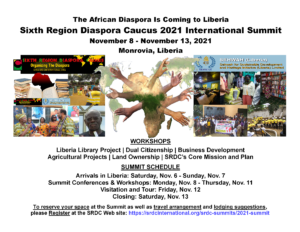 Every year except 2015 (during an organizational reset) and 2020 (due to the COVID-19 pandemic), SRDC has met for its annual International Summit. (Slide shows of images from the various SRDC International Summits can be seen here.) The Organizing Committees from the different states meet to share their progress with their organizing plans, exchange ideas and work on how their local efforts will coalesce into a national and an international strategy to bring the voice of the Grassroots Pan-Afrikan Diaspora to the World Stage.
Every year except 2015 (during an organizational reset) and 2020 (due to the COVID-19 pandemic), SRDC has met for its annual International Summit. (Slide shows of images from the various SRDC International Summits can be seen here.) The Organizing Committees from the different states meet to share their progress with their organizing plans, exchange ideas and work on how their local efforts will coalesce into a national and an international strategy to bring the voice of the Grassroots Pan-Afrikan Diaspora to the World Stage.
Organizations from Canada, Central America, the Caribbean, Europe and the Middle East also attend the Summit, making this a truly international collaboration among Pan-Afrikan organizers.
The location varies from year to year, with a different local organization taking on the host duties each year.
The 2021 SRDC International Summit
The 2021 SRDC International Summit will be held November 8-13, 2021 in Monrovia, Liberia. This will be the first International Summit SRDC has held outside the United States.
SRDC and Sehwah-Liberia
The partnership between SRDC and Sehwah-Liberia began in 2015 with the launching of the Library Project Initiative. Baba Kumasi Palmer, SRDC-South Carolina Facilitator, and Madam Louise Siaway, Sehwah-Liberia’s Founder and Director, began to promote the idea of establishing the first-ever public library to serve the West African nations of Liberia, Cote D’Ivoire, Sierra Leone and Guinea-Conakry, to be based in Monrovia, Liberia. This project also represents an historic opportunity for African Descendants in the Diaspora, particularly the United States, to re-establish and strengthen ties to the Mother Continent through the nation that was established as a destination point for African People who had been freed from the bonds of slavery in the United States. This project has grown into an opportunity to establish real, on-the-ground connections between the Mother Continent and the Diaspora and to advance SRDC’s primary goal of bringing the resources, expertise and voice of the Diaspora to the World Stage for the advancement of Africa and her Scattered Black Children around the world.
The Library Project, which we will discuss further below, is not the only initiative being pursued by SRDC and Sehwah. During the Summer of 2019, the organizations worked together on two important projects in Liberia:
- Pan African Virtual Summer Camp and Cultural Exchange: The Virtual Summer Camp was held during the months of July and August of 2020. About a dozen high school students in the United States (Maryland) participated, along with over 40 Liberian students, in an online summer education program, led by Madam Louise Siaway in Liberia and Mama Maisha Washington, a veteran educator and member of the Maryland Council of Elders and SRDC Maryland Organizing Committee, in the United States. Instructors from both countries led virtual classes on environmental science, project management, linguistics, information technology, yoga, African dance, coding, Swahili, cooking, oral history, African geography, culture and astronomy. The resulting cultural interaction between students and instructors from Liberia and the United States was designed to help broaden the students’ view and vision of Africa, leading to more effective communication, along with developing skills in project management, compromise/consensus, negotiation, decision making and problem solving. The students who completed this summer program successfully would then become a part of the first phase of building the Library in Monrovia, Liberia. All students who participated received a Summer Camp T-Shirt, a Summer Camp Cap and a Summer Camp Duffel Bag in addition to the instruction they received and the memories of an enjoyable summer program. Sadly, Mama Maisha passed on to the Honored Ancestors suddenly in October 2020. We hope to be able to duplicate the effort in following summers to properly honor Mama Maisha and her great work as an educator of African children on both sides of the Atlantic. More information on the Virtual Summer Camp can be found here.
- COVID-19 Food Distribution Drive: As a result of the COVID-19 pandemic, on the 10th of April 2020, the Government of Liberia declared a State of Emergency, coupled with a Nationwide Lockdown. In the wake of this State of Emergency, SEHWAH and its collaborating US based partner organization SRDC (Sixth Region Diaspora Caucus) launched a food distribution drive to supplement the government’s efforts in providing food assistance to the needy people. This was necessary in order to alleviate the hardship and suffering which came as the result of the government’s stay at home order. While the government’s stay at home order is necessary to prevent the spread of the deadly pandemic, enforcing it was very problematic because the common complaint of many people was, “how can we survive if we cannot go out to look for our daily bread?”In wealthy nations, governments provide stimulus relief packages to their citizens while they are told to stay home and practice social distancing. In Liberia, such a gesture from the government was not put in place and the economic hardship was creating problems among the citizens. As such, SEHWAH Liberia Inc. and its collaborating partner, SRDC joined together to launch the fund raising campaign in support of their food donation campaign. This campaign consisted of food and material distributions in various communities in Monrovia. This campaign mainly targeted the most vulnerable such as children, elderly men and women as well as the people living with disabilities. According to Madam Louise Siaway, former Assistant Minister for Cultural Affairs at the Ministry of Information in Liberia and founder of SEHWAH, who personally led this effort, the recipients of the food donation have been very grateful and thankful to the SEHWAH-SRDC partnership for thinking about them in this time of serious health crisis and its adverse consequences. Along with the food, we also donated face masks as well as bottles of hand sanitizer. For more information, including the full report on the food distribution effort, click here.
The Liberia Library Project
In 2018, a delegation from SRDC. led by SRDC’s International Facilitator Prof. David Horne, traveled to Monrovia, Liberia to meet with local Elders and community leaders and to bring the project to build Liberia’s first public library closer to fruition. As this historic meeting was taking place, Baba Kumasi Palmer was leading an effort to gather donated books from across the United States to help jump-start the establishment of the library. While plans have been discussed and made for obtaining a plot of land for the library and preparing plans for the building, the book-donation drive has continued. See the SRDC article on the book donation project, the SRDC post on the Liberia Library Project and the SRDC Library Project Page for more details.
The Library Project will be one of the major discussion points of the Summit.
The Summit Schedule
This is a general schedule of activities for the Summit as of this date. As more details are established, we will share them here.
Arrivals in Liberia: Saturday, Nov. 6 – Sunday, Nov. 7
Summit Conferences & Workshops: Monday, Nov. 8 – Thursday, Nov. 11
Reception: Thursday Evening, Nov. 11
Visitation and Tour: Friday, Nov. 12
Closing: Saturday, Nov. 13
Summit Workshops (Tentative; Subject to Change)
Liberia Library Project: As mentioned above, the Library Project is a key agenda item for this year’s Summit. We will discuss the progress that has been made toward realizing the region’s first public library and plans for completing the project.
Dual Citizenship: This has been an important topic in all of SRDC’s Summits. As we work to establish and strengthen our connection to our ancestral home, the option of repatriation to Africa has become more attractive to African Descendants around the world, especially in the United States, where the recurring insults to our quest for equality (voter suppression measures, police killings of African Descendant citizens, acts of racial terrorism, economic exploitation and other legal and civil acts of aggression) have convinced a growing number of us that we will never be fully welcome in the United States and other countries where we are relegated to “minority” status. Even those of us who feel fully accepted in the West have often felt the strong desire to re-connect with our ancestral home, and have thus chosen to repatriate to African nations from Ghana to Tanzania to Kenya, in particular. The establishment of Dual Citizenship rights in African countries would facilitate our increased ability to contribute materially to the welfare of our Sisters and Brothers in Africa.
Land Ownership: There has been some confusion about the difference between “land ownership”, “land leasing” and “right to abode” among African-American expatriates. Several thousand African-Americans emigrated to Ghana over the last several decades, seeking to establish dual citizenship, voting rights and land ownership in their new home. For years, many of them waited, with some degree of frustration, as their bid to establish citizenship, and the rights associated with it, in Ghana were frustrated by what they saw as bureaucracy influenced by a degree of nationalist bias. Many of them lived in Ghana under a “right to abode” concept, which granted them the right to live in the country but denied them the right to actually purchase and own land, which is considered central to the establishment of true citizenship, personal security and the prospect of building a business. We hope to discuss the issues surrounding land ownership and its impact on other aspects of the enjoyment of full citizenship in our ancestral home.
Business Development: A connection between African and African-Descendant businesses is an important component of the advancement of the people. African artisans, artists, farmers and other businesses are often isolated from the global marketplace, except in cases where there is a natural resource (coltan, oil, mining) that can be exploited by both the East and the West. Building connections between African and African-Descendant business interests, based on African cultural principles, can provide important leverage on the World Stage for our common needs and priorities.
Agricultural Projects: African farmers are increasingly endangered by global interests from the United States and China who are continuing to buy up and appropriate lands for their own agricultural projects, often involving the production of genetically-modified (GM) foods. Traditional farming methods are increasingly being replaced by industrial-farming methods that have stripped the soil and polluted the environment in the United States and Chine in particular, and thus these nations as well as others are looking to Africa to help them grow food for their populations and not for the people of Africa. Some self-styled philanthropic efforts, such as Water Efficient Maize for Africa (WEMA) and other projects of the Gates Foundation and the United States Agency for International Development (USAID) have depended excessively on GM and industrial-farming technology at the expense of traditional, organic and natural farming methods that have been successfully applied by smallholder farmers for millennia. Meanwhile, Black farmers in the United States continue to be marginalized, their lands being steadily taken from them through legal maneuvering by mendacious lawyers as well as the United States Department of Agriculture (USDA). The Pigford lawsuits have crystallized the abuse Black farmers have endured in the United States, even as new legal and legislative efforts have been launched on behalf of White farmers to prevent Black farmers from winning the redress to which they are entitled. This has created a natural alliance between African farmers and their African-American Sisters and Brothers that must be established and strengthened, for the sake of Black farmers everywhere, for African People in general and for the people of the world who will ultimately depend on food from Africa to help combat world hunger. We will discuss how to develop farmland in Liberia in particular to help lift up the Liberian people and create opportunities for partnerships between Africa’s farmers and Black farmers in the United States.
SRDC’s Core Mission and Plan: SRDC was established in 2006 to seek to establish the voice of the Diaspora in the African Union, inspired by the AU’s 2003 Constitutive Act which encouraged the inclusion of the Diaspora in “the development of the African Continent and the building of the African Union”:
“The prime directive of the Sixth Region Diaspora Caucus is to provide a coherent organizational voice for Diasporan participation in the African Union; to establish and maintain that participation at a high quality, well-informed, diplomatic and strategic level; to provide a tangible vehicle for focusing the resourcefulness, expertise and experience of Diasporans on defining a stronger, more positive African future; and to be a consistent, reliable reference point for AU-Diasporan networking, partnership and collaboration.” (2013 SRDC Mission Statement)
The difficulties that have come from the often-bureaucratic nature of international politics have led to often-maddening delays in the realization of that mission. The US-backed war against Libya in 2011 eliminated a major financial support for the AU and its initiatives, and thus the effort to bring the Diaspora into the AU as voting members of its civil-society organ, the Economic, Social and Cultural Council (ECOSOCC) have taken a back seat. As a result, at the 2013 SRDC International Summit in Los Angeles, California, the Mission Statement was slightly amended.
“The prime directive of the Sixth Region Diaspora Caucus is to provide a coherent organizational voice for Diasporan participation in the international arena; to establish and maintain that participation at a high quality, well-informed, diplomatic and strategic level; to provide a tangible vehicle for focusing the resourcefulness, expertise and experience of Diasporans on defining a stronger, more positive African future; and to be a consistent, reliable reference point for African-Diasporan networking, partnership and collaboration.”
This minor change has allowed SRDC to continue its advocacy for Diasporan representation in the African Union, as well as to push for similar initiatives in the United Nations (most likely though the UN’s Working Group of Experts on People of African Descent or the Permanent Forum on People of African Descent) and independent Pan-African civil-society organizing, such as the newly-formed Pan African Federalist Movement (PAFM) and similar organizations.
Key to this effort will be the re-establishment of SRDC’s initial strategy for organizing the Diaspora “on-the-ground”: the holding of Pan-Afrikan Town Hall Meetings at the local level wherever people of African Descent live, and the building of Cooperative Coalitions and United Fronts to bring the thousands of Black organizations together and establish a voice on the World Stage for all African people.
Accommodation Options in Liberia
Accommodations range from staying in Community Guest Houses to sharing rental homes to standard hotel-room arrangements. SRDC’s priority is hotel and guesting accommodations that are Liberian-owned and -operated.
SRDC is gathering information on hotel and guest house accommodations. When we put together a good list of affordable, reputable and comfortable options we will share them on this page, so check this page regularly to see what options we come up with. Meanwhile, it is a good idea to do some personal independent research of your own. If you have specific questions about this or other aspects of the 2021 SRDC Summit, you can contact:
Baba Kumasi Palmer
SRDC South Carolina State Facilitator
Phone: (843) 452-4880
Email: horojoe@gmail.com
Travel Arrangements
Air travel varies in availability, scheduling and expense depending on when reservations are made.
Air travel packages are being researched. You are recommended to shop for affordable and safe air travel arrangements, but as options are found we will post them here. Check back here for updates. You can also contact Baba Kumasi Palmer (contact information is listed above) to find out what airfare packages we have researched.
Most, if not all, airlines will be observing stringent requirements for negative tests and/or vaccinations for COVID-19 and Yellow Fever as are the governments and health ministries of Liberia and other countries. Be sure to read the section below concerning Vaccinations and Protocols Required to ensure that your travel will be safe, pleasant and uncomplicated by preventable issues upon arrival in or departure from Liberia.
Vaccinations and Testing Protocols Required
The primary diseases for which vaccinations and/or negative test documentation will be required for travelers to Liberia are COVID-19 and Yellow Fever. It is always a good idea to consult with medical professionals concerning travel, testing and vaccinations for COVID-19, Yellow Fever and other potential disease or health issues.
COVID-19
Required Protocols and Precautions
We include below information from the Liberia Health Ministry, the Centers for Disease Control and Prevention (CDC) and the US State Department/US Embassy in Liberia with regard to traveling to Liberia and the current protocols in place to ensure against the spread of COVID-19 as a result of such travel. Be sure to check the various notices and Web sites listed and linked below on a regular basis for any important updates, as the situation on the ground may change from week to week (or even more frequently) in countries around the world with regard to COVID-19 prevalence. For example, in July 2021, the United States was listed by the Centers for Disease Control and Prevention (CDC) as High (Level 3 Travel Advisory) while Liberia was listed as Very High (Level 4 Travel Advisory). As of mid-August 2021, the roles were reversed: Liberia was listed as Level 3 (High) while the United States was listed as Level 4 (Very High). This may be a result of an increasingly effective response to the pandemic in Liberia as vaccines and other measures became more widely available, as well as continued confusion in the United States among its populace about such measures.
COVID-19 TESTING PROTOCOL FOR TRAVELERS:
Government of Liberia Health Ministry
The purpose of these guidelines is to protect Liberia from the further spread of COVID-19 and to limit the spread Of COVID-19 from Liberia to other countries. All travelers must wear a mask during transit and upon arrival in Liberia. All non-exempt* incoming and outgoing travelers will be tested for COVID-19 in Liberia. The testing fee is US$75. This fee will be used to support the costs associated with the COVID•19 outbreak response, e.g. testing, case investigation, contact tracing, and data management. Travelers should ensure they provide correct contact details and will receive a unique identification number to retrieve their test result online.
ALL travelers are encouraged to register (commonly known as the Apps) at http://liberiacovidtravel.org prior to their trips.
Requires a pre PCR test application and fill out the requested information.
PCR Laboratory Test is conducted within 3 days (72 hours) of their flight.
PCR Results of tests that were conducted more than three days (72 hours) before their flight will not be accepted.
On August 20, 2021, the Ministry of Health revised its COVID-19 National Guidelines. The new guidelines include, but are not limited to, the following:
- Mask-wearing and handwashing are mandatory in public, as well as social distancing of at least three feet
- Gathering sizes are limited, as is capacity for certain businesses and public transportation
- Persons who have tested positive for COVID-19 and their contacts are required to comply with the guidelines of health authorities and related health rules
- Refer to the complete COVID-19 National Guidelines on the Ministry of Health website
Assistance:
U.S. Embassy in Monrovia
502 Benson Street
+231 77-677-7000
ACSMonrovia@state.gov
https://lr.usembassy.gov
U.S. State Department – Consular Affairs
888-407-4717 or 202-501-4444
Liberia Embassy Washington DC
5201 16th Street, NW, Washington, DC 20011
Phone: 202-723-0437, Fax: 202-723-0436
www.liberianembassyus.org
Open: Monday to Thursday, 10 AM to 3:00 PM
Closed: Liberian Holidays and Federal Holidays
Refer to the complete COVID-19 National Guidelines at https://bit.ly/3cScIx8.
US Centers for Disease Control and Prevention (CDC)
The Centers for Disease Control and Prevention (CDC) has issued a Level 3 Travel Health Notice (High Level of COVID -19 in Liberia) indicating a high level of COVID-19 in the country. It advises that all travelers to Liberia should be fully vaccinated before travel; unvaccinated travelers should avoid nonessential travel to Liberia. Your risk of contracting COVID-19 and developing severe symptoms may be lower if you are fully vaccinated with an FDA authorized vaccine. Before planning any international travel, please review the CDC’s specific recommendations for vaccinated and unvaccinated travelers.
The CDC recommendations are that travelers should “Make sure you are fully vaccinated before traveling to Liberia. Unvaccinated travelers should avoid nonessential travel to Liberia.
“Because of the current situation in Liberia, all travelers may be at risk for getting and spreading COVID-19 variants. Travelers should follow recommendations or requirements in Liberia, including wearing a mask and staying 6 feet apart from others.”
See recommendations for fully vaccinated and unvaccinated travelers.
United States Embassy in Liberia/US State Department
From the United States Embassy in Liberia Web Site, https://lr.usembassy.gov/covid-19-information/, last updated August 23, 2021:
The U.S. Centers for Disease Control and Prevention (CDC) has issued a Level 3 Travel Health Notice (High Level of COVID -19 in Liberia) indicating a high level of COVID-19 in the country. It advises that all travelers to Liberia should be fully vaccinated before travel; unvaccinated travelers should avoid nonessential travel to Liberia. The Department of State has issued a Level 3 Travel Advisory (Reconsider Travel) for Liberia due to COVID-19. During an emergency, the U.S. government may have very limited ability to provide assistance. The Department of State provides additional advice for travelers in these areas in the Travel Advisory. Conditions in any country may change at any time. …
Local Resources:
By U.S. Mission Liberia | 17 August, 2020 | Categories: Alert, Notification, U.S. Citizen Services
There is a lot more information on the US Embassy Web site (https://lr.usembassy.gov/covid-19-information/), and we recommend visiting that site if you want to explore details of their travel recommendations more fully. These include a full discussion of the US Embassy’s recommendations, available COVID-19 PCR and antigen testing, vaccine information, entry and exit requirements, movement restrictions, quarantine information, transportation options, fines for non-compliance with protocols, consular options and requirements for traveling through Europe, entering and leaving the United States and Liberia, and they can all be found at the US Embassy’s Web site, https://lr.usembassy.gov/covid-19-information/. Check this and the other referred Web sites on a regular basis for any important updates, as the situation may change from week to week (or more frequently) as the situation on the ground changes in countries around the world with regard to COVID-19 prevalence.
The Centers for Disease Control and Prevention (CDC) has an interactive world map that displays a country’s current COVID status on a color-coded scale:
Gray = Level Unknown
Tan = Level 1 (Low Risk Assessment)
Light Orange = Level 2 (Moderate Risk Assessment)
Deep Orange = Level 3 (High Risk Assessment)
Deep Red = Level 4 (Very High Risk Assessment)
The map is interactive and can be zoomed in and out for more detailed analysis, and clicking on a country will bring up a brief description of the assessed risk level. For perspective, travelers from the United States should note that as of August 26, the US was rated as a Very High Risk Assessment by the CDC (Level 4, Deep Red), as were Spain, Portugal, France, The Netherlands, the United Kingdom and Ireland. The map, which updates regularly, can be found at the following site:
COVID-19 Travel Recommendations by Destination | CDC, also https://www.cdc.gov/coronavirus/2019-ncov/travelers/map-and-travel-notices.html
Yellow Fever
Entry requirements. A Yellow Fever vaccination certificate is only required for travelers 9 months of age and older coming from a country with risk of Yellow Fever transmission. The vaccination requirement is imposed by this country for protection against Yellow Fever since the principal mosquito vector Aedes aegypti is present in its territory.
World Health Organization (WHO)
The World Health Organization (WHO) requires that all travelers must have yellow fever vaccination, documented on a yellow fever card, which is commonly known as a yellow book.
The following comes from the World Health Organization (WHO) Web site, https://www.who.int/news-room/fact-sheets/detail/yellow-fever:
Vaccination is the most important means of preventing yellow fever.
The yellow fever vaccine is safe, affordable and a single dose provides life-long protection against yellow fever disease. A booster dose of yellow fever vaccine is not needed.
Several vaccination strategies are used to prevent yellow fever disease and transmission: routine infant immunization; mass vaccination campaigns designed to increase coverage in countries at risk; and vaccination of travellers going to yellow fever endemic areas.
For a full discussion of yellow fever, its symptoms, method of transmission, diagnosis, treatment and prevention (including vaccination), go to the World Health Organization Web site, https://www.who.int/news-room/fact-sheets/detail/yellow-fever.
US Centers for Disease Control and Prevention (CDC)
The Centers for Disease Control and Prevention (CDC) also advises vaccination against yellow fever and supports the vaccine mandates listed above by the World Health Organization and Liberia Health Ministry. From the CDC’s Yellow Fever Vaccination Information Statement “Yellow Fever Vaccine: What You Need To Know”, https://www.cdc.gov/vaccines/hcp/vis/vis-statements/yf.pdf:
Yellow fever vaccine is a live vaccine containing weakened, live yellow fever virus. It is given as a single shot. One dose provides lifelong protection for most people.
Yellow fever vaccine is recommended for:
-
- People 9 months through 59 years of age who are traveling to or living in areas at risk for yellow fever virus activity, or traveling to a country with an entry requirement for vaccination. (People younger than 9 months or older than 59 years who are at increased risk might receive yellow fever vaccine in some situations. Ask your health care provider for more information.)
- Laboratory personnel who might be exposed to yellow fever virus or vaccine virus.
Yellow fever vaccine is given only at designated vaccination centers. After getting the vaccine, you will be given an “International Certificate of Vaccination or Prophylaxis” (ICVP, sometimes called the “yellow card”). You will need this card as proof of vaccination to enter certain countries. If you don’t have it, you might be required to get yellow fever vaccine upon entering the country, or be forced to wait for up to 6 days to make sure you are not infected.
Do not donate blood for 14 days after vaccination, because there is a risk of passing vaccine virus to others during that period.
Passports, Visas and Other Required Documentation
Passports
For this and any international travel, attendees will be required to possess a current valid passport. For travelers from the United States, passport application and renewal procedures can be found at the usa.gov Web site, “Getting or Renewing a U.S. Passport”, at Getting or Renewing a U.S. Passport | USAGov or https://www.usa.gov/passport.
Visa-Upon-Arrival
Visa upon Arrival has to be processed by your host/representative* in Liberia has to send a letter requesting the Visa Upon Arrival to The Commissioner General of the Liberia Immigration Service. You must send a copy of your passport with all your information via email, and it must hold the following information: Your name and nationality. The host/representative in Liberia is:
*Madam Louise W. M. Siaway
Founder and President
Sehwah-Liberia
https://www.sehwahliberia.org/
Government Offices of Assistance:
U.S. Embassy Monrovia
502 Benson Street
+231 77-677-7000
ACSMonrovia@state.gov
https://lr.usembassy.gov
U.S. State Department – Consular Affairs
888-407-4717 or 202-501-4444
Liberia Embassy Washington DC
5201 16th Street, NW, Washington, DC 20011
Tel: 202-723-0437, Fax: 202-723-0436
www.liberianembassyus.org
Open: Monday to Thursday, 10 AM to 3:00 PM
Closed: Liberian Holidays and Federal Holidays
Registration in the 2021 SRDC International Summit
To participate in the 2021 SRDC Summit, please complete the short Registration Form by visiting the SRDC Web site at https://srdcinternational.org/srdc-summits/2021-summit.
Related Articles
Bridging the Gap Between Ourselves (Our African Connection) by Baba Kumasi Palmer, SRDC South Carolina Facilitator
Like this:
Like Loading...
 The Pan African Global Trade and Investment Conference, which had been announced on this Web site for January 14-16, 2022, has been postponed.
The Pan African Global Trade and Investment Conference, which had been announced on this Web site for January 14-16, 2022, has been postponed.
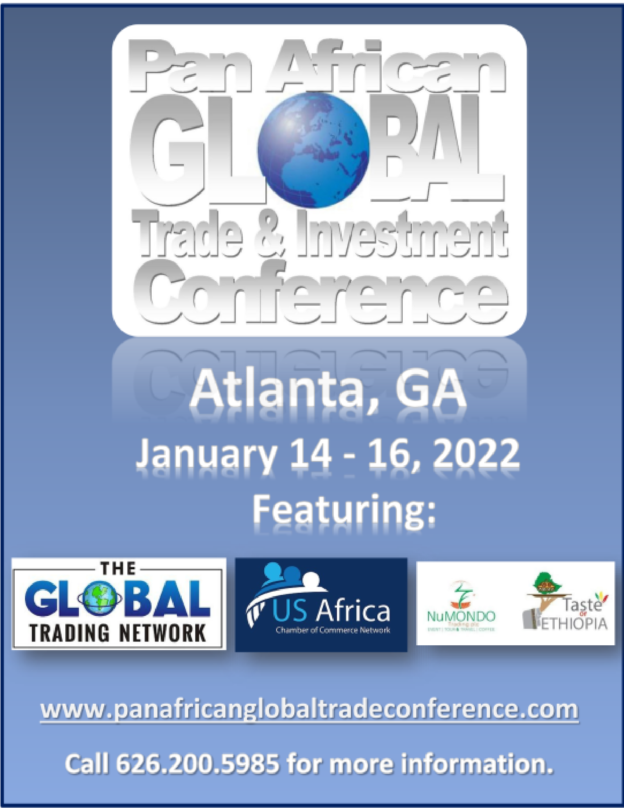
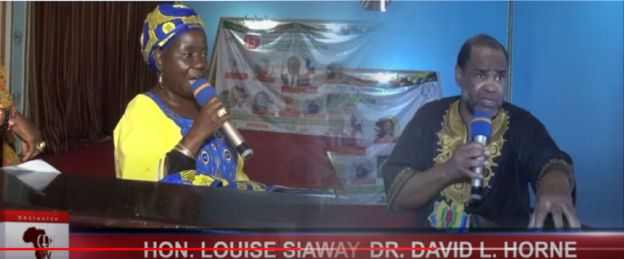
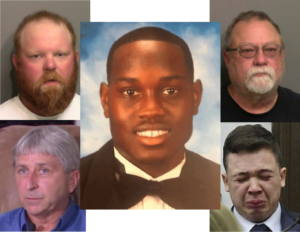 The week leading up to the traditional Thanksgiving holiday served up a mixed buffet to those who abhor racism, White supremacy and wanton vigilantism and who have cried out for justice against these scourges on society.
The week leading up to the traditional Thanksgiving holiday served up a mixed buffet to those who abhor racism, White supremacy and wanton vigilantism and who have cried out for justice against these scourges on society.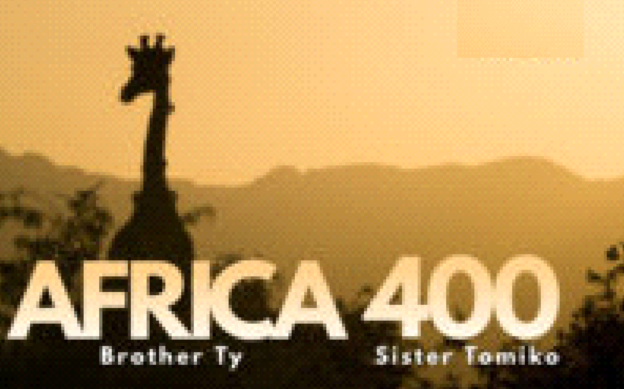
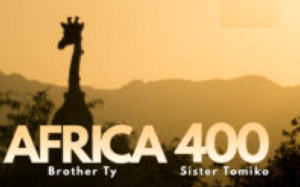 Africa400, the weekly Pan-Afrikan radio show hosted by Mama Tomiko and Baba Ty, with Special Episodes guest-hosted by Grandmother Walks On Water (“Mothership”) and Baba Francois Ndengwe (“Fresh News From Africa”), is taking a break from broadcasting as they make plans for the coming year.
Africa400, the weekly Pan-Afrikan radio show hosted by Mama Tomiko and Baba Ty, with Special Episodes guest-hosted by Grandmother Walks On Water (“Mothership”) and Baba Francois Ndengwe (“Fresh News From Africa”), is taking a break from broadcasting as they make plans for the coming year.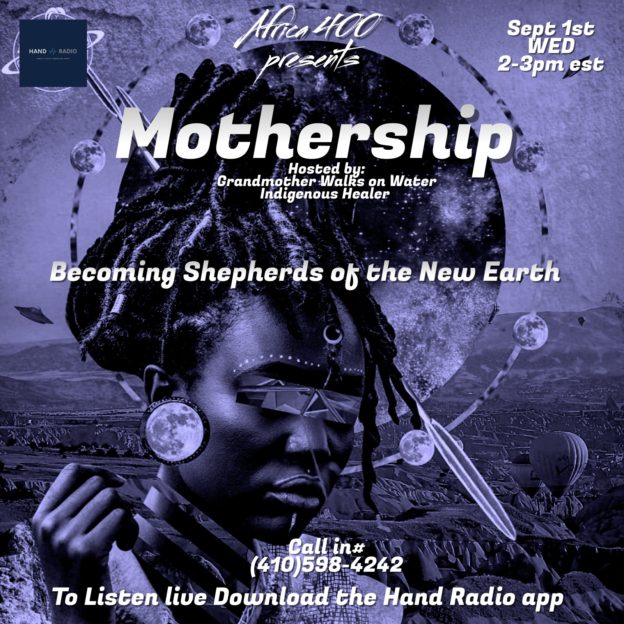
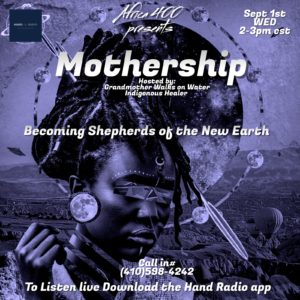
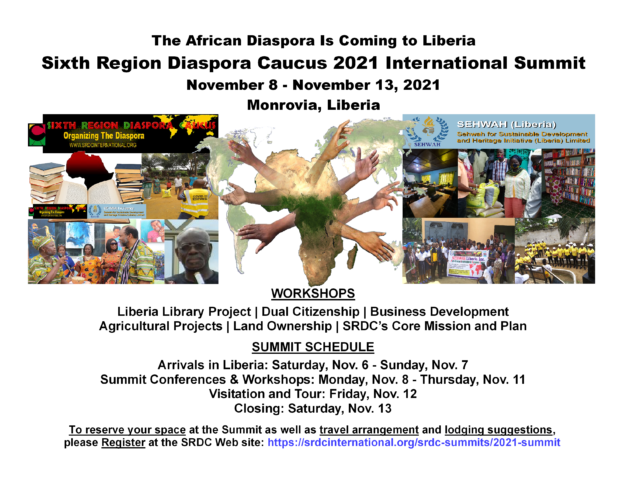
 Every year except 2015 (during an organizational reset) and 2020 (due to the COVID-19 pandemic), SRDC has met for its annual International Summit. (Slide shows of images from the various SRDC International Summits can be seen
Every year except 2015 (during an organizational reset) and 2020 (due to the COVID-19 pandemic), SRDC has met for its annual International Summit. (Slide shows of images from the various SRDC International Summits can be seen 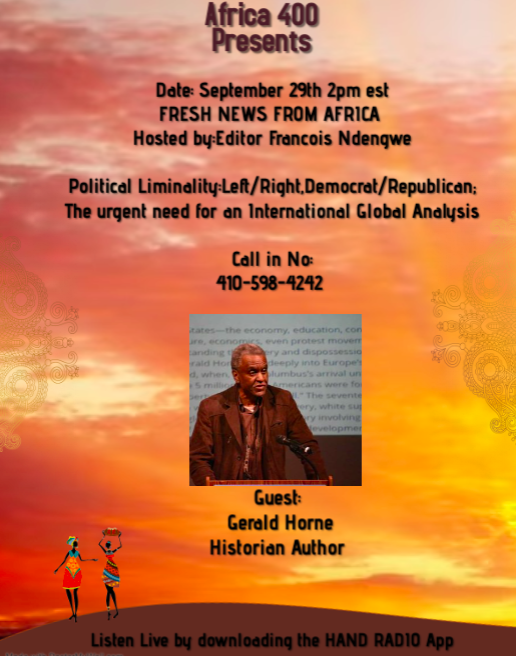
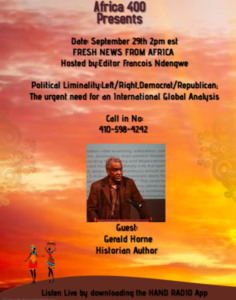 Dr. Gerald Horne, noted historian and author of several groundbreaking books on African and African-American history, will be the special guest of host Baba Francois Ndengwe on the “Fresh News From Africa” program, presented courtesy of Africa400 on HANDRadio. The show airs on Wednesday, September 29. He will discuss The Urgent Need for an International Global Analysis, particularly among African People and People of African Descent.
Dr. Gerald Horne, noted historian and author of several groundbreaking books on African and African-American history, will be the special guest of host Baba Francois Ndengwe on the “Fresh News From Africa” program, presented courtesy of Africa400 on HANDRadio. The show airs on Wednesday, September 29. He will discuss The Urgent Need for an International Global Analysis, particularly among African People and People of African Descent.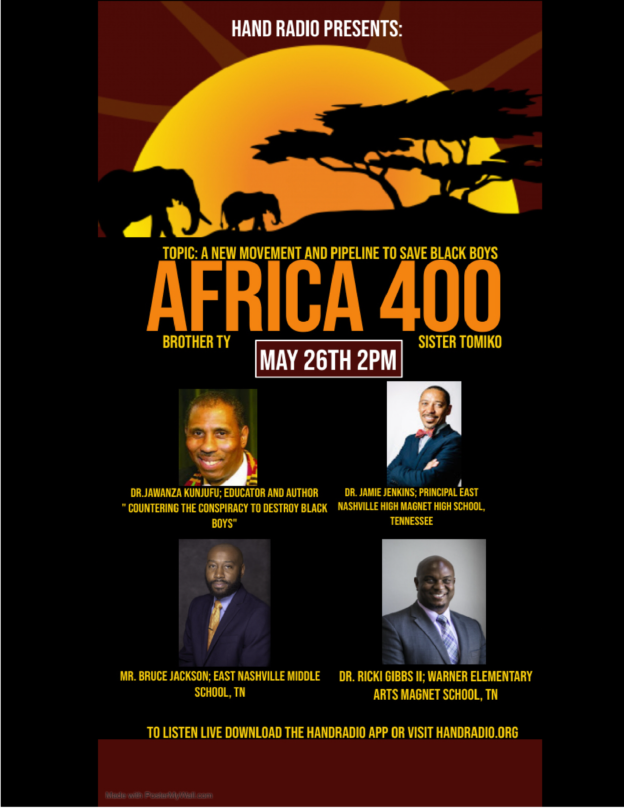
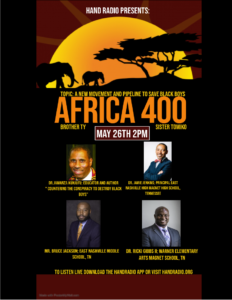
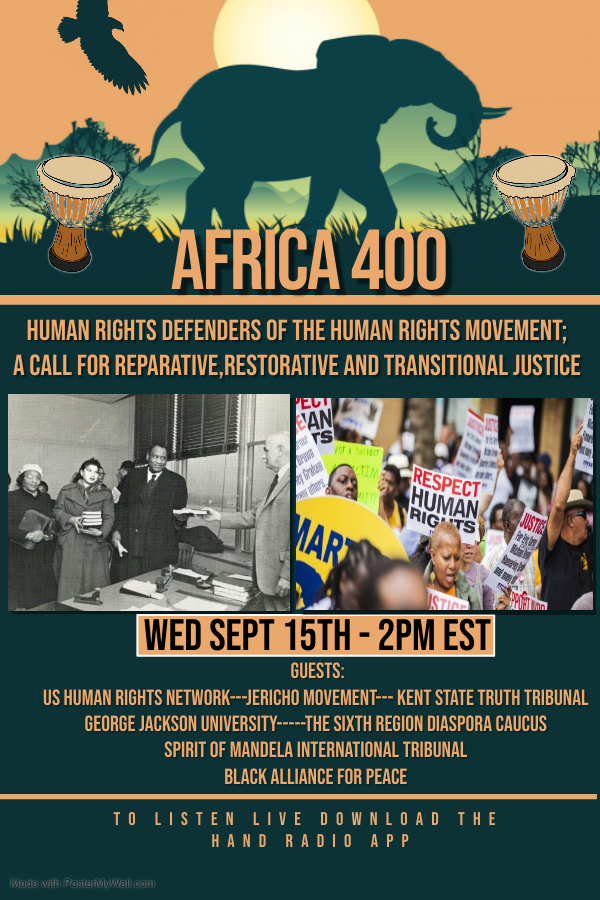
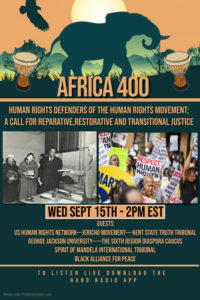 The Wednesday, September 15 edition of Africa400 features a panel of guests representing several organizations working in defense of human rights and the empowerment of People of African Descent. Show hosts Mama Tomiko and Baba Ty welcome members of several organizations to discuss their roles in the pursuit of human rights, restorative justice and raising the voice of the grassroots Pan-Afrikan Diaspora and marginalized communities.
The Wednesday, September 15 edition of Africa400 features a panel of guests representing several organizations working in defense of human rights and the empowerment of People of African Descent. Show hosts Mama Tomiko and Baba Ty welcome members of several organizations to discuss their roles in the pursuit of human rights, restorative justice and raising the voice of the grassroots Pan-Afrikan Diaspora and marginalized communities.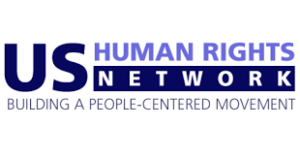 The US Human Rights Network (
The US Human Rights Network (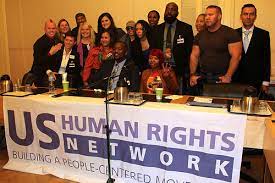 network of organizations and individuals working to strengthen a human rights movement and culture within the United States led by the people most directly impacted by human rights violations. We work to secure dignity and justice for all.
network of organizations and individuals working to strengthen a human rights movement and culture within the United States led by the people most directly impacted by human rights violations. We work to secure dignity and justice for all.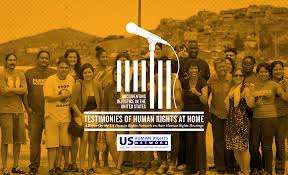 across issue areas, constituencies, and regions to uphold and defend human rights and hold government accountable;
across issue areas, constituencies, and regions to uphold and defend human rights and hold government accountable;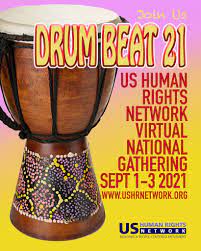 Facilitating effective collective action to secure the structural change needed to fully realize human rights.
Facilitating effective collective action to secure the structural change needed to fully realize human rights.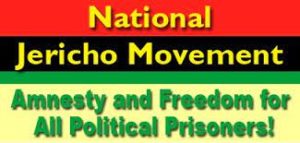 Jericho is a movement with the defined goal of gaining recognition of the fact that political prisoners and prisoners of war exist inside of the United States, despite the United States’ government’s continued denial … and winning amnesty and freedom for these political prisoners.
Jericho is a movement with the defined goal of gaining recognition of the fact that political prisoners and prisoners of war exist inside of the United States, despite the United States’ government’s continued denial … and winning amnesty and freedom for these political prisoners.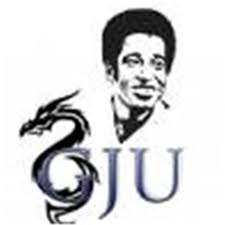 AN OVERVIEW
AN OVERVIEW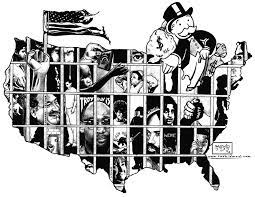 In 2003, Abdul Olugbala Shakur, Sitawa Nantambu Jamaa, Hodari Kambon, Abasi Ganda, Yafeu I-yapo, Dr. Donald R. Evans, and Dr. Rashad Ali developed the concept of transforming the entire U.S. Prison Industrial Slave-Complex (P.I.S.C.) into the largest university in the country. The initial name for the project was University of the Mind, but under this title we received very minimum feedback, so by Summer of 2003 we decided to name our university The George Jackson University (GJU),
In 2003, Abdul Olugbala Shakur, Sitawa Nantambu Jamaa, Hodari Kambon, Abasi Ganda, Yafeu I-yapo, Dr. Donald R. Evans, and Dr. Rashad Ali developed the concept of transforming the entire U.S. Prison Industrial Slave-Complex (P.I.S.C.) into the largest university in the country. The initial name for the project was University of the Mind, but under this title we received very minimum feedback, so by Summer of 2003 we decided to name our university The George Jackson University (GJU),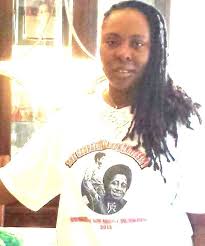 applications for enrollment into our GJU from New Afrikan (Afrikan Amerikan) prisoners across the country, we even received applications from as far as Brazil, London, and Canada, brothas and sistas trying to connect.
applications for enrollment into our GJU from New Afrikan (Afrikan Amerikan) prisoners across the country, we even received applications from as far as Brazil, London, and Canada, brothas and sistas trying to connect.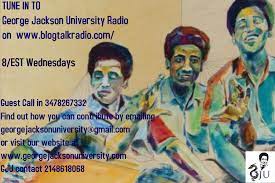 towards revising the GJU is developing a strong and dedicated outside support network and faculty . We are re-instituting the concept of transforming the entire U.S. prison industrial slave complex into the largest progressive educational institution in the country with emphasis on Afro-centric and Pan-Afrikan studies and New Afrikan political education.
towards revising the GJU is developing a strong and dedicated outside support network and faculty . We are re-instituting the concept of transforming the entire U.S. prison industrial slave complex into the largest progressive educational institution in the country with emphasis on Afro-centric and Pan-Afrikan studies and New Afrikan political education.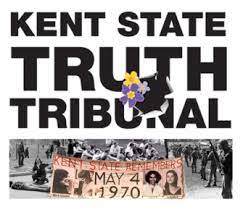 On May 4, 1970 a troop of Ohio National Guardsmen opened fire on unarmed Kent State
On May 4, 1970 a troop of Ohio National Guardsmen opened fire on unarmed Kent State 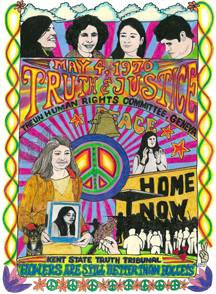 students protesting America’s invasion of Cambodia. Four students were shot dead and nine others wounded. Ten days later, also in a student protest against the Vietnam War, two Jackson State College students were killed and more than 11 wounded by the Mississippi police.
students protesting America’s invasion of Cambodia. Four students were shot dead and nine others wounded. Ten days later, also in a student protest against the Vietnam War, two Jackson State College students were killed and more than 11 wounded by the Mississippi police. 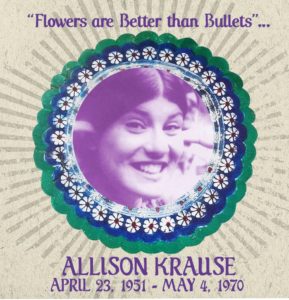 Forty years after Kent State in 2010, new digital forensic evidence emerged in a tape recording of the Kent State commands-to-fire and gunfire. Still, the U.S. Dept. of Justice
Forty years after Kent State in 2010, new digital forensic evidence emerged in a tape recording of the Kent State commands-to-fire and gunfire. Still, the U.S. Dept. of Justice  The Sixth Region Diaspora Caucus (
The Sixth Region Diaspora Caucus (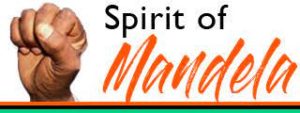 Created in 2018, In the Spirit of Mandela Coalition (
Created in 2018, In the Spirit of Mandela Coalition (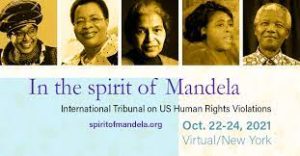 together against the systemic, historic, and ongoing human rights violations and abuses committed by the USA against Black, Brown, and Indigenous People. The Coalition recognizes and affirms the rich history of diverse and militant freedom fighters Nelson Mandela, Winnie Mandela, Graca Machel Mandela, Rosa Parks, Fannie Lou Hamer, Ella Baker, and many more. It is in their Spirit and affirming their legacy that we work. This October 22-25 2021, In the Spirit of Mandela Coalition will be organizing and hosting an International Tribunal which will be charging the United States government, its states, and specific agencies with human and civil rights violations against Black, Brown, and Indigenous people. The Tribunal will be charging human and civil rights violations for:
together against the systemic, historic, and ongoing human rights violations and abuses committed by the USA against Black, Brown, and Indigenous People. The Coalition recognizes and affirms the rich history of diverse and militant freedom fighters Nelson Mandela, Winnie Mandela, Graca Machel Mandela, Rosa Parks, Fannie Lou Hamer, Ella Baker, and many more. It is in their Spirit and affirming their legacy that we work. This October 22-25 2021, In the Spirit of Mandela Coalition will be organizing and hosting an International Tribunal which will be charging the United States government, its states, and specific agencies with human and civil rights violations against Black, Brown, and Indigenous people. The Tribunal will be charging human and civil rights violations for: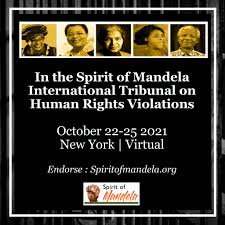 Racist police killings of Black, Brown, and Indigenous people.
Racist police killings of Black, Brown, and Indigenous people.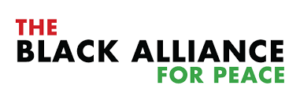 The Black Alliance for Peace (BAP),
The Black Alliance for Peace (BAP),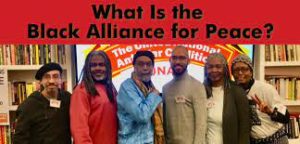 PRINCIPLES OF UNITY
PRINCIPLES OF UNITY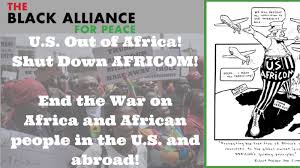 SELF-DETERMINATION
SELF-DETERMINATION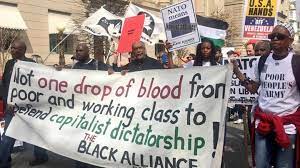 INTERSECTIONALITY
INTERSECTIONALITY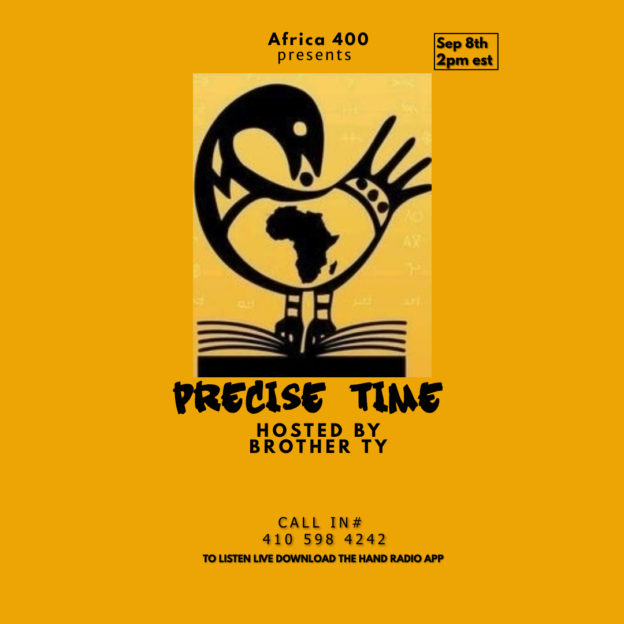
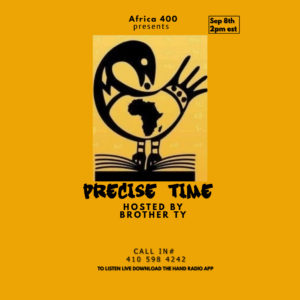 Baba Ty hosts “Precise Time” on the Wednesday, September 8 edition of Africa400. Baba Ty examines the key issues of the day from his perspective as a developmental psychologist, cultural historian and Pan-Afrikan activist.
Baba Ty hosts “Precise Time” on the Wednesday, September 8 edition of Africa400. Baba Ty examines the key issues of the day from his perspective as a developmental psychologist, cultural historian and Pan-Afrikan activist.